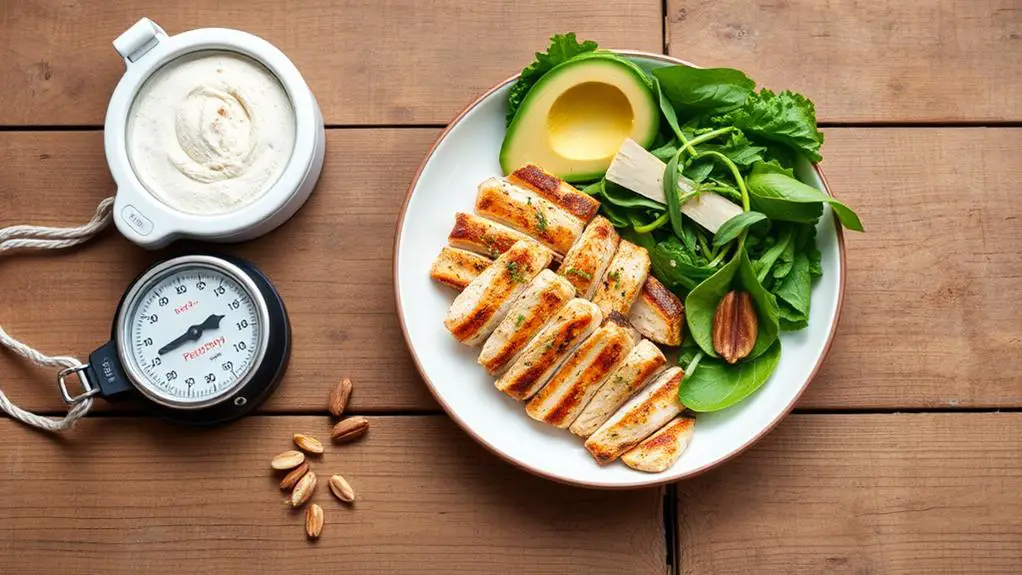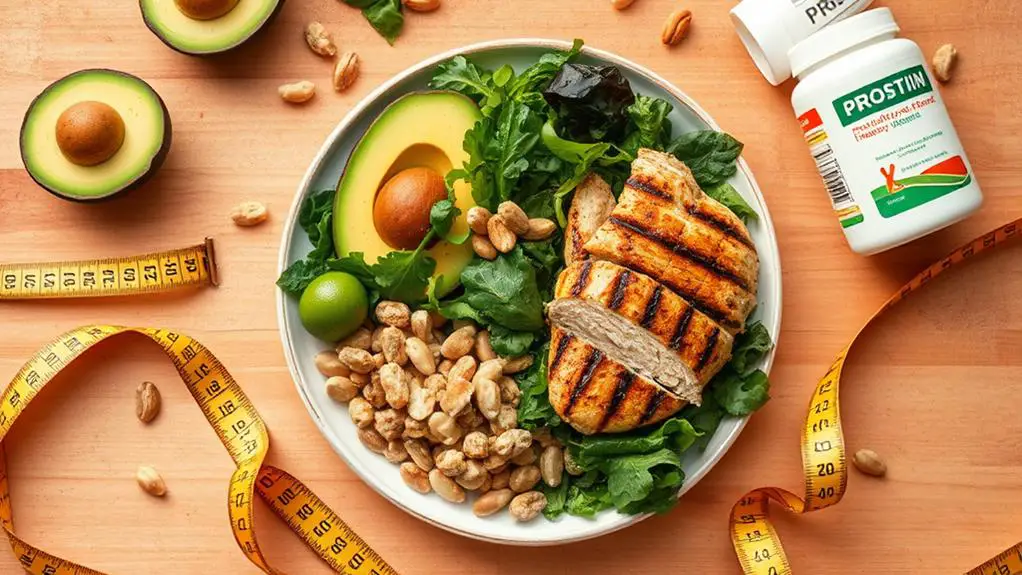
Protein is super important in the keto diet because it helps build muscles, keeps you full, and controls your metabolism while you stay in ketosis. You should eat enough protein, but not too much, to keep burning fat instead of sugar. Usually, you need about 1.2 to 2.0 grams of protein per kilogram of body weight, depending on how active you are. Too much protein can mess with your keto goals by raising blood sugar levels. So, aim for balance and choose good quality protein like meat, fish, and eggs. For more intriguing details, stick around.
Key Takeaways
- Protein Allocation: Protein should comprise 20-30% of daily calories, targeting 1.2-2.0 g/kg of target body weight.
- Activity-Based Needs: Active individuals need 1.6-2.0 g/kg, while sedentary individuals require 1.2-1.6 g/kg.
- Protein Distribution: Spread protein intake evenly across meals (15-25 grams) to optimize muscle synthesis and maintain ketosis.
- Excess Protein Caution: Consuming too much protein can disrupt ketosis by increasing blood sugar levels through gluconeogenesis.
- Prioritize Quality: Choose high-quality, nutrient-dense protein sources like grass-fed meats and fatty fish to meet dietary needs.
Understanding the Keto Diet
The ketogenic diet, a high-fat, moderate-protein, and low-carbohydrate dietary regimen, fundamentally alters the body's metabolic processes to promote ketosis. This shift allows the body to use fat as its primary fuel source instead of glucose.
Although the diet was initially created in the 1920s to help people with epilepsy, it's now widely popular for weight loss and other health benefits.
Despite its growing popularity, there are many keto misconceptions. Some people think it means eating unlimited amounts of bacon and cheese, but the diet actually emphasizes healthy fats like those from avocados, nuts, and olive oil.
Understanding these dietary adaptations is vital for success with keto. It's not just about cutting carbs; it's about making smart, healthy choices.
Achieving ketosis requires limiting daily carbohydrate intake to 5-10% of total calories, or about 20-50 grams. This restriction forces the body to produce ketone bodies from fat, a process that can take several days.
Interestingly, while protein is essential, too much can prevent ketosis by triggering gluconeogenesis, where the body converts amino acids into glucose. Therefore, balancing protein intake is key to maintaining ketosis.
Protein's Role in the Body
Integral to countless biological processes, protein stands as a cornerstone of human health, composed of 20 amino acids, including nine essential ones that must be sourced from the diet. Protein plays a pivotal role in tissue building and muscle repair, making it indispensable for those who engage in regular physical activity.
Through protein synthesis, our bodies constantly break down and recycle proteins, maintaining an amino acid balance fundamental for muscle maintenance and recovery support.
Additionally, protein serves as a key component in enzyme production, which is essential for various metabolic functions and overall metabolic health. Hormones, another important element, rely on protein to regulate numerous bodily processes.
The satiety effects of protein cannot be overstated; it slows digestion and increases the thermic effect of food, aiding in weight management by reducing overall calorie intake.
Dietary sources of protein, such as lean meats, dairy, beans, and nuts, contribute greatly to preserving lean mass, especially important for older adults at risk of sarcopenia.
Protein Requirements on Keto
Guiding protein requirements on a ketogenic diet requires careful consideration to maintain the delicate balance between achieving ketosis and meeting the body's essential needs.
Protein should make up about 20-30% of your daily calories, translating to around 1.2-2.0 grams per kilogram of your target body weight. For people who are active, this amount should be closer to 1.6-2.0 g/kg. If you're more on the sedentary side, you can aim for the lower end of the spectrum.
Overweight individuals should base their protein needs on their target weight, not their current weight. This helps with effective fat loss while keeping muscle mass intact.
It's also super important to spread your protein intake throughout the day. Think 15-25 grams per meal, which helps optimize muscle protein synthesis. But watch out—too much protein can mess up your ketosis by bumping up blood sugar levels!
- Feeling energized and strong
- Avoiding muscle loss
- Achieving your weight goals
- Maintaining steady blood sugar levels
Calculating Your Protein Needs
Determining your protein needs on a ketogenic diet is crucial for achieving your dietary and fitness goals. To calculate your protein requirements, aim for 1.2 to 2.0 grams of protein per kilogram of your target body weight, adjusting based on your activity level and goals.
Active individuals not in a caloric deficit should aim for around 1.6 grams per kilogram. Conversely, if you're in a caloric deficit, higher intakes of 2.4 to 3.0 grams per kilogram may be beneficial.
Overweight individuals should base their protein needs on their target weight rather than their current weight to avoid overconsumption. A practical guideline is to consume a minimum of 60 grams of protein daily, distributed across meals. This helps optimize muscle protein synthesis through effective protein timing.
When it comes to protein types, incorporating a variety of sources such as meats, fish, eggs, and plant-based options will guarantee a balanced intake.
Utilizing portion sizes, like aiming for a serving of protein comparable to the size of a deck of cards per meal, can help achieve daily protein goals effectively. This approach simplifies the process and makes tracking easier.
Protein and Ketosis
Balancing protein intake is not only about meeting your body's needs but also about maintaining the delicate metabolic state of ketosis. In a keto diet, protein should account for 20-30% of your daily calories. This helps provide essential amino acids while ensuring you stay in ketosis.
However, eating too much protein can kick you out of ketosis because of a process called gluconeogenesis, where your body converts protein into glucose.
To stay in ketosis, aim for 1.2 to 2.0 grams of protein per kilogram of your target body weight. The exact amount depends on your activity level and personal goals.
Monitoring your protein timing and protein quality is essential. Eating large amounts of protein in one meal can spike your blood sugar, so spreading out your protein intake throughout the day can help keep your blood sugar stable.
Combining protein with fats in your meals can also help. This not only moderates blood sugar spikes but also supports your overall metabolic state.
- Too much protein can kick you out of ketosis!
- Spread out your protein throughout the day.
- Combine protein with fats for better results.
- Monitor your protein intake closely.
Gluconeogenesis Explained
Gluconeogenesis is a significant metabolic process wherein the liver produces glucose from non-carbohydrate sources, primarily amino acids. This process becomes especially important when carbohydrate intake is low, like in a ketogenic diet. It helps maintain the blood glucose levels necessary for essential functions, especially for organs like the brain that need glucose for energy.
In the context of a ketogenic diet, gluconeogenesis works alongside ketogenesis, where fatty acids are turned into ketone bodies, another energy source. Although gluconeogenesis can slightly raise blood sugar levels, it generally produces minimal glucose. This allows people in ketosis to keep their energy levels steady without causing significant insulin spikes.
The process of gluconeogenesis occurs continuously, even when someone is in ketosis. It guarantees that the body has the necessary glucose for its metabolic needs without relying heavily on dietary carbohydrates.
Gluconeogenesis regulation is significant because it assures that glucose production meets the body's needs without overdoing it. This balance is key to maintaining overall metabolic health.
Adjusting Protein Intake

When adjusting protein intake on a keto diet, it's important to calculate how much protein you personally need, considering your activity level and weight goals.
Active people may need more protein to keep their muscles strong, while others might need less to stay in ketosis.
Balancing your protein sources, like meat, fish, and plant-based options, can help you get the right amount without overdoing it.
Personalized Protein Calculations
Determining personalized protein needs on a ketogenic diet is essential for achieving ideal health and fitness goals. To tailor protein intake effectively, consider personalized protein strategies and target weight considerations.
Typically, aim for 1.2 to 2.0 grams of protein per kilogram of your target body weight. This range guarantees you get enough protein without going overboard. If you're active and not cutting calories, 1.6 grams per kilogram is a solid choice. On the other hand, if you're working on weight loss and are in a caloric deficit, increasing your intake to 2.4 to 3.0 grams per kilogram could be beneficial.
Calculate your protein needs using your target weight, especially if you're overweight. This method helps to avoid excessive protein consumption, which can interfere with ketosis. Spread your protein intake throughout the day, aiming for 15-25 grams per meal to maintain muscle protein synthesis.
Adjust your protein intake regularly based on your progress and changes in body composition.
- Feeling stuck? Personalized protein strategies can provide a path forward.
- Overwhelmed by numbers? Simplify with target weight considerations.
- Need a boost? Proper protein can enhance your results.
- Worried about progress? Regular adjustments keep you on track.
Adjusting for Activity Level
Adjusting protein intake according to activity level is a critical aspect of optimizing a ketogenic diet for individual needs. People have different activity levels, and their protein needs vary accordingly.
If you're hitting the gym regularly with resistance training or high-intensity workouts, you might need more protein, around 2.4-3.0 g/kg of body weight, to help with muscle repair and growth. This helps meet the metabolic demands and recovery needs that come with intense exercise.
On the other hand, if you're active but not necessarily in a caloric deficit, a moderate protein intake of about 1.6 g/kg can help maintain muscle mass and support performance optimization. For those with a more sedentary lifestyle, consuming around 1.2-1.6 g/kg should suffice, ensuring you get enough nutrition without overdoing it.
Protein adjustments should also consider dietary preferences and individual variations. Your fitness goals—whether they're about muscle preservation, weight loss, or muscle gain—play a big role in determining your protein needs.
Regularly monitoring your activity levels and evaluating your dietary needs will help you refine your protein intake, aligning it perfectly with your personal objectives and overall health on a ketogenic diet.
Balancing Protein Sources
Balancing protein sources within a ketogenic diet is essential for achieving ideal health outcomes and maintaining ketosis. To get the right balance, protein should make up about 20-30% of your daily calories, which equals 1.2-2.0 grams per kilogram of your goal weight. This varies depending on how active you are and your specific goals. Don't worry, it's not as complicated as it sounds!
First, focus on high-quality, nutrient-dense options like grass-fed meats, poultry, fatty fish, eggs, and full-fat dairy. Be cautious with high-carb protein sources like breaded meats and sweetened yogurts, as they can sneak in unwanted carbs.
Also, don't forget to include plant-based proteins to keep things varied and interesting.
Another key is protein timing. Spread your intake evenly across meals, aiming for 15-25 grams of protein per meal. This helps maximize muscle protein synthesis and keeps you feeling full throughout the day.
Watch your protein intake closely, as too much can kick you out of ketosis by triggering gluconeogenesis.
To stay on track, remember to:
- Prioritize high-quality, nutrient-dense protein sources
- Be cautious of hidden carbs in certain protein foods
- Distribute protein intake evenly throughout the day
- Include a variety of protein sources, both animal and plant-based
Protein Sources on Keto
When following a keto diet, it's essential to choose the right protein sources to stay in ketosis.
Whole food options like beef, chicken, and fish are excellent, but protein supplements can also be helpful, especially for those with busy lifestyles.
Just remember to steer clear of high-carb protein sources like breaded meats and sweetened dairy products.
Whole Food Protein Sources
Whole food protein sources form the backbone of a ketogenic diet, offering essential nutrients while maintaining low carbohydrate levels. Choosing the right proteins can make a world of difference.
Grass-fed beef is a top choice, providing not only high-quality protein but also essential fatty acids. Organic dairy products, like cheese and Greek yogurt, add variety while keeping carbs low and protein intake high.
Eggs are another versatile option, delivering about 25 grams of protein from just four large eggs, along with healthy fats to keep you satiated. For those looking to diversify, plant-based protein sources such as tofu, nuts, and seeds can be included. However, keep an eye on portion sizes to avoid creeping up on your carb limit.
Here are some nutrient-packed options to contemplate:
- Grass-fed beef: Rich in protein and healthy fats, perfect for varied meals.
- Organic dairy: Adds flavor and texture without the carbs.
- Plant-based protein: Offers diversity but requires portion control.
- Eggs: Versatile and nutrient-dense, great for any meal.
Protein Supplement Options
Maximizing protein intake on a ketogenic diet can sometimes pose a challenge, particularly for individuals with busy lifestyles or specific dietary preferences. To bridge the gap, protein supplements are an excellent option.
Various protein powder types, such as whey protein and collagen peptides, offer a convenient way to boost protein intake without adding extra carbs. Whey protein is especially popular, thanks to its rich amino acid profile and easy digestibility. Collagen peptides, on the other hand, are fantastic for joint health and skin elasticity, making them a dual-purpose supplement.
For those following a vegan protein regimen, plant-based protein powders like pea protein and hemp protein are viable alternatives. These vegan protein options guarantee that even those avoiding animal products can meet their protein needs while maintaining ketosis. Just remember to check the labels for hidden carbs!
In addition to protein powders, there are other practical supplements, like protein bars and shakes, tailored for keto enthusiasts. However, it's essential to avoid high-carb impostors like sweetened dairy products or breaded meats, which can kick you out of ketosis.
Common Misconceptions

How often do we hear that high protein intake disrupts ketosis? It's one of the most common protein myths out there.
However, sticking to a recommended intake of 1.2-2.0 g/kg of target body weight typically keeps ketosis right on track. It's also vital to understand that not all protein sources are created equal on a keto diet. Prioritizing high-quality, nutrient-dense options like grass-fed meats and organic eggs can make all the difference.
Many people think the same protein intake works for everyone, but this isn't true. Factors such as activity level, body composition, and individual health conditions mean that protein needs are highly personal.
Personalized calculations are essential for ideal intake.
There's also a misconception that protein causes significant blood sugar spikes. In reality, when protein is part of a mixed meal with fats, it can help moderate glucose absorption and keep blood sugar levels stable.
Additionally, some assume plant-based proteins are sufficient on their own. But to get all essential amino acids, you need to combine different plant proteins.
- Misunderstanding protein and ketosis
- Believing all protein sources are equal
- Assuming uniform protein needs
- Overlooking the role of mixed meals in blood sugar management
Benefits of Adequate Protein
Understanding the benefits of adequate protein intake on a ketogenic diet is key to optimizing health outcomes. Consuming the right amount of protein, typically between 1.2 to 2.0 grams per kilogram of target body weight, helps preserve muscle mass during weight loss and prevents muscle loss. This is essential, especially when you're burning fat for fuel on a keto diet. Plus, protein digestion itself burns calories, thanks to its thermic effect, which means more energy is spent just breaking it down!
Moreover, protein contributes to satiety, making you feel full and helping control your appetite. This can lead to eating fewer calories overall, which is great for shedding those extra pounds. For those with type 2 diabetes, increased protein intake can improve glycemic control and promote better insulin sensitivity.
Here's a quick peek at the benefits:
| Benefit | Description | Importance |
|---|---|---|
| Muscle Preservation | Prevents muscle loss during weight loss | Keeps you strong |
| Satiety | Helps control appetite | Reduces overall calorie intake |
| Thermic Effect | Increases calorie expenditure | Boosts metabolism |
| Glycemic Control | Improves blood sugar levels | Helps manage diabetes |
| Workout Recovery | Aids in muscle repair | Supports training efforts |
In addition, sufficient protein intake supports muscle synthesis, which is essential for recovery from workouts. So, make sure you're getting enough protein to keep your body in top shape!
Risks of Excess Protein

When you eat too much protein on a keto diet, it can mess up your ketosis by turning protein into sugar, which is especially risky for people with type 1 diabetes.
Besides, too much protein can cause tummy troubles like bloating or discomfort.
Plus, relying on high protein all the time might mean you're missing out on other important nutrients, making it essential to keep an eye on how much protein you consume.
Impact on Ketosis
Excessive protein consumption in a ketogenic diet poses significant risks to maintaining ketosis, primarily due to the process of gluconeogenesis. When you eat too much protein, your body can start converting those extra amino acids into glucose. This can spike your blood sugar levels, pushing you out of ketosis. It's like playing a game of Jenga; one wrong move, and everything collapses.
To stay in ketosis, you should aim for 1.2-2.0 grams of protein per kilogram of your target body weight. This helps guarantee most of your calories come from fats.
But keep in mind, the timing and quality of protein also matter. Eating high-quality protein at the right times can help you maintain that delicate balance.
Imagine this:
- You've worked hard to get into ketosis, only to ruin it with a steak binge.
- Excess protein can trigger insulin spikes, especially risky for those with type 1 diabetes.
- Struggling to stay in ketosis can be frustrating, like trying to catch a slippery fish.
- Careful planning is essential; otherwise, you risk turning your keto dream into a nightmare.
Digestive Health Concerns
Frequently overlooked, the digestive health concerns arising from excessive protein intake on a ketogenic diet warrant serious consideration. Eating too much protein can cause problems like constipation and bloating, especially if your fiber intake is low due to the diet's carb restrictions. When you load up on protein, your gut microbiome, the tiny organisms living in your digestive tract, can get out of balance. This can lead to discomfort and changes in how you digest food.
Also, your kidneys might struggle to filter out all the byproducts of protein metabolism. This is even riskier if you have pre-existing kidney issues. Overloading on protein can also mess with gut motility, causing delayed gastric emptying and even gastrointestinal disorders.
| Issue | Cause | Effect |
|---|---|---|
| Constipation & Bloating | Low fiber intake | Uncomfortable and irregular bowel habits |
| Kidney Strain | High protein consumption | Potential kidney damage |
| Gut Microbiome Disruption | Excess protein intake | Gastrointestinal discomfort |
Nutrient Imbalance Risks
A key concern with excessive protein intake on a ketogenic diet is the risk of nutrient imbalances, which can have significant health implications.
Eating too much protein can trigger gluconeogenesis, where amino acids turn into glucose, messing up ketosis and raising blood sugar levels. This can disrupt the main goal of the keto diet.
High protein consumption might also strain the kidneys, especially for people with kidney issues. This can lead to more complications and even kidney damage.
Additionally, focusing too much on protein can cause nutrient deficiencies because it reduces food variety. If you're always eating meat and skipping fruits and veggies, you're missing out on important nutrients.
- Increased blood sugar levels disrupting ketosis
- Kidney strain, leading to potential damage
- Reduced food variety causing nutrient deficiencies
- Higher LDL cholesterol levels, raising heart disease risk
Sticking to a protein intake beyond the recommended 1.2-2.0 g/kg of target body weight can also raise LDL cholesterol levels, which is bad news for your heart.
If you're not careful, long-term high protein levels might cause muscle breakdown, undoing the good effects of the keto diet.
Monitoring and Adjustments
Regular monitoring of protein intake is vital for those following a ketogenic diet, as it helps maintain the delicate balance required for ketosis. Too much protein can lead to gluconeogenesis, where the body converts protein into glucose, potentially kicking you out of ketosis. That's why protein tracking is important. By keeping an eye on your protein intake, you can make sure you're not overdoing it.
Meal timing also plays a role. Spreading your protein throughout the day, aiming for about 15-25 grams per meal, can help optimize muscle protein synthesis and keep you feeling full. This approach guarantees your body gets a steady supply of protein without overwhelming it all at once.
Adjustments to your protein needs depend on factors like how active you are, your body composition, and your specific health goals. Generally, recommendations range from 1.2 to 2.0 grams per kilogram of your target body weight.
If you have type 1 diabetes, working with a healthcare professional to tailor your intake is smart, as protein can affect blood glucose levels.
And remember, your protein needs might change. Whether you're increasing your exercise, aiming for weight loss, or recovering from an injury, periodic reassessment is key to staying on track.
Frequently Asked Questions
How Much Protein Do You Really Need on Keto?
On a ketogenic diet, protein needs vary based on activity levels, generally ranging from 1.2-2.0 grams per kilogram of target weight. Ideal protein sources and strategic protein timing are essential for maintaining muscle mass and promoting effective ketosis.
What Happens if You Don't Eat Enough Protein on Keto?
Inadequate protein intake on a keto diet can lead to muscle loss, energy depletion, and hunger pangs. Additionally, it may cause metabolic slowdown, nutrient deficiencies, and impaired immune function, adversely affecting overall health and well-being.
How Much Is Too Little Protein on Keto?
Consuming less than 1.2 g/kg of protein from quality protein sources can lead to muscle loss and impaired recovery. Proper protein timing is essential to maintain metabolic health and satiety, particularly for individuals on a ketogenic diet.
What Is the Protein Portion Size on Keto Diet?
On a ketogenic diet, protein portion sizes should equate to a deck of cards per meal, approximately 20-30 grams. Ideal protein sources and protein timing, ideally 15-25 grams per meal, are essential for muscle maintenance and metabolic function.
Conclusion
In sum, protein plays an essential role in the keto diet, ensuring muscle maintenance and overall health. The amount needed depends on individual factors like body weight and activity level. While adequate protein supports ketosis and provides numerous benefits, excess intake can hinder progress. Understanding and monitoring protein consumption is imperative for optimizing the ketogenic experience. Balancing protein intake effectively can enhance the diet's success and promote long-term well-being.










No Comments